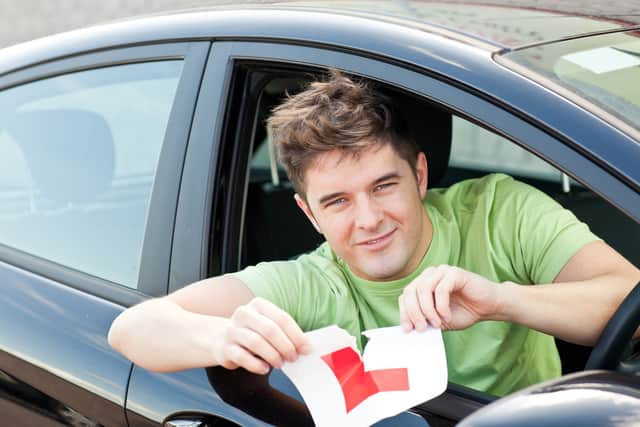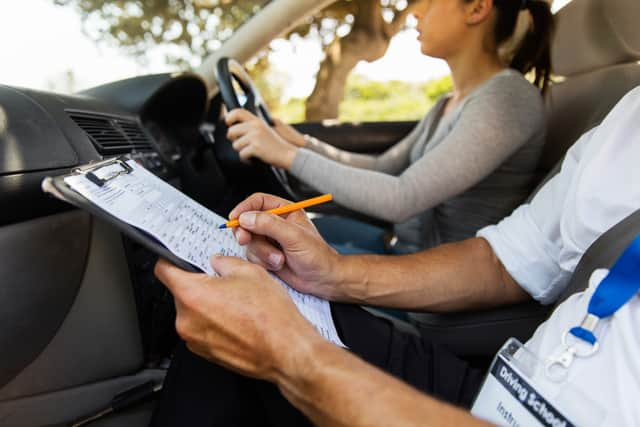Driving test experts’ advice on how to be test-ready and pass first time: from common fails to practice tips
and live on Freeview channel 276
Driving test pass rates are falling in Britain, according to the latest figures.
Pass rates were down from 48.1% in the last quarter of 2021 to 47.1% in the first three months of 2022, prompting calls for learners to ensure they are properly prepared to take the test.
Advertisement
Hide AdAdvertisement
Hide AdPass rates climbed to more than 50% during the pandemic when very few tests were conducted but have slipped back as testing numbers return to normal. They have fallen from a high of 59.3% in the first quarter of 2021, when just 1,308 tests were conducted, to 51.6% in April-June 2021 and 47.1% in the first quarter of 2022.
With drivers facing waiting times of up to three months to secure a test slot, the DVSA is urging learners to be fully prepared before booking and sitting their practical test.


DVSA chief executive Loveday Ryder said: “With less than half of learners passing, I’d urge them to use our Ready to Pass? checklist to make sure they’re ready – and delay their test if they’re not. This will help make more tests available and prevent people having to pay to re-test.”
To help learners make sure they are properly prepared, we asked experts from RED Driving School and Driving Test Success for their tips on how to be test ready.
Ask your instructor if you’re ready
Advertisement
Hide AdAdvertisement
Hide AdThe most obvious factor in being test ready is making sure your skills and knowledge are up to scratch.
Emma Bagnall from the Driving Test Success app says: “It’s really important that you’re not pressurised into taking your theory or driving test if you don’t feel fully prepared. Ask yourself…am I making silly mistakes whilst out driving, do I rely on prompts from my instructor, have I recently failed a mock test? If the answer is yes to any of these, then it could be a sign that you’re not quite ready. Talk to your instructor and remember, you can always push your test date back to allow you more time to get test ready.”
Seb Goldin, CEO of RED Driving School echoes this. He says: “Any professional driving instructor will only put their pupils forward if they are confident that they are in a position to pass. Confidence is key during a drive test. Be sure not to doubt your abilities – your instructor would not be encouraging you to take a test if you weren’t deemed ready.”
Practice and take mock tests
Experts agree that you shouldn’t go into a driving test without some idea of what it’s going to be like. So once your instructor thinks you are close to test ready, try sitting a mock test with them. This will allow you to experience test conditions ahead of the real thing and allow you to practice the various elements, including manoeuvres and the show me, tell me questions as you’ll face them on test day.


Advertisement
Hide AdAdvertisement
Hide AdSeb says: “The ‘show me, tell me’ vehicle safety questions will be asked at the start of the driving test and while you’re driving. While you can’t fail the driving test on these questions alone, being confident in your responses ahead of the test will put your mind at ease – especially as the “tell me” question will be at the start of your test. Get familiar with the controls on your car, so you’re comfortable and practiced on the day.”
If you can, it also helps to head out with a friend or family member to get extra practice alongside paid-for lessons. Emma says: “Whether you’re taking your theory or practical test, doing your homework, and getting lots of practice really is key.
“When it comes to practical tests, hours spent on the road with an instructor or licensed friend/family member can make a world of difference. Trying out manoeuvres in a quiet car park on a Sunday evening is something that a lot of people find useful too, as these are the test sections that many people worry about the most.”
Think about the location, date and even time of your test
It’s a myth that driving test centres have a quota of passes or fails to give out, but it is true that certain conditions can help or hinder your likelihood of earning a full licence, including where and when you take your test.
Advertisement
Hide AdAdvertisement
Hide AdEmma explains: “Test centres in cities typically have slightly lower pass rates whereas those in the suburbs or more rural areas often have higher pass rates. This may be due to cities having more cars and road users to be aware of, more speed cameras and changing speed restrictions, and lots of traffic lights. All of these can put learners on edge and throw them off their game. That said, once again if these busy, central routes have been practiced then there is no need to panic or avoid them.
“Test slots during weekday rush hours also usually have slightly lower pass rates whereas those at the weekend tend to have slightly higher pass rates. It does vary by location though.”
Emma suggests researching government data on pass rates at local test centres by location and date. However, her advice comes with a warning: Every test centre uses different routes and becoming familiar with those routes can also help build up confidence. Booking a test at a centre with a very high pass rate is very unlikely to help secure a first-time pass unless the learner is also really familiar with that area and has got lots of miles in behind the wheel.”
Be aware of common failures
The DVSA releases information on the most common causes of driving test failure and it’s reliably the same issues every time.
Advertisement
Hide AdAdvertisement
Hide AdEmma says: “A lot of these are quite basic, day-to-day driving skills, so learners that have got plenty of practice in really have nothing to worry about. This list can help to identify any tricky areas though, so practice can make perfect ahead of the big day.
Among the most common causes for failure are not making effective observations at junctions; not using mirrors correctly when changing direction; not having proper control over the steering, including steering late or mounting the pavement; poor road positioning; no moving off salfey and not responding correctly to traffic signs.
Plan for test day
As well as being confident you have the skills and knowledge to pass the test, Seb Goldin says there are other more practical measures you can take to be prepared for the big day and give yourself the best chance of passing.
Know the logistics of the day
Seb advises: “Ensure that you liaise with your driving instructor on the exact timings of the day, including a warm-up lesson before arriving at the test centre. Additionally, it’s key that you have all the necessary documents, including your provisional licence and theory test pass certificate, in an easy to access place.”
Advertisement
Hide AdAdvertisement
Hide AdYou’ll most likely sit your test in your instructor’s car but if you don’t you must make sure your car meets the DVSA’s rules and isn’t on its list of banned vehicles.
Plan your nutrition
“Even if you think you won’t be thirsty or hungry, it’s vital that you prioritise feeling nourished on the day of your test,” says Seb. “Plan ahead the night before and make sure that you choose nutritious foods. Although tempting, it is wise to avoid too much caffeine. In terms of food, we recommend slow energy release foods such as porridge, banana or cereal bars.
Get a good night’s sleep
Finally, Seb says, make sure your as refreshed as possible before your test; He says: “It’s basic but it’s necessary – a good night sleep is more beneficial than one may think.”
Comment Guidelines
National World encourages reader discussion on our stories. User feedback, insights and back-and-forth exchanges add a rich layer of context to reporting. Please review our Community Guidelines before commenting.
